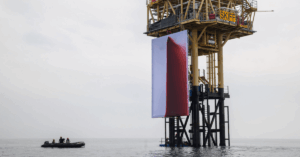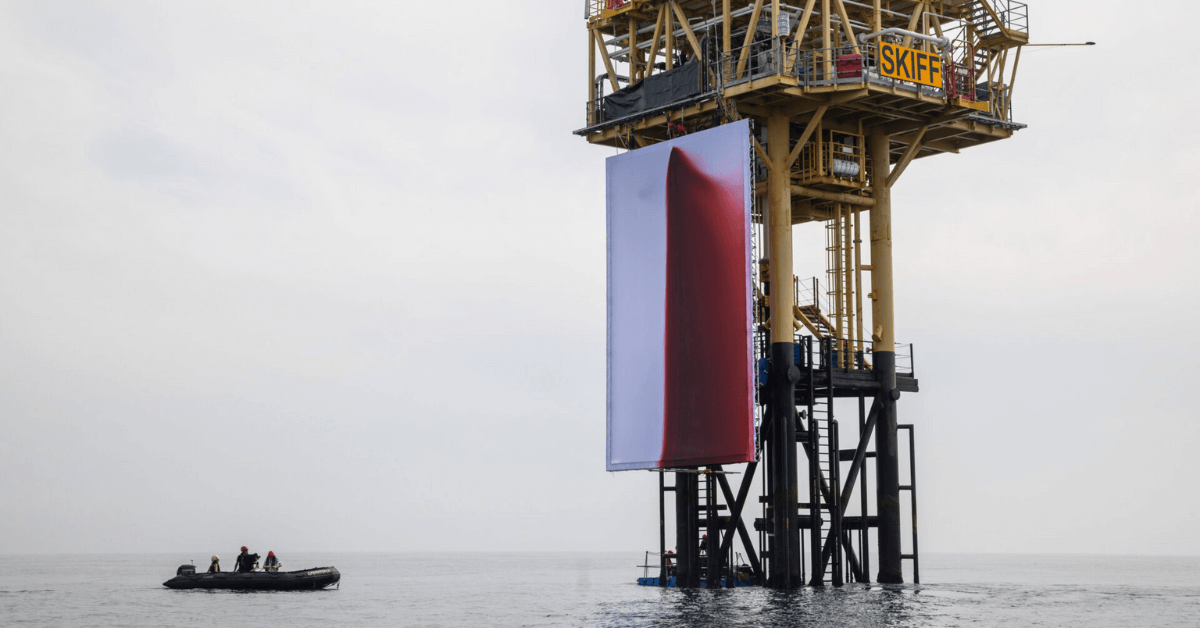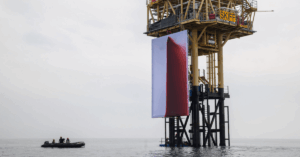
Fire Breaks Out On Maersk’s Ultra-Large Containership Off Liberia
August 16, 2025
World’s Largest Cruise Ship Refuelled With LNG For First Time At Port Canaveral
August 16, 2025

Greenpeace activists staged a dramatic protest on Shell’s Skiff gas platform in the North Sea by installing a new artwork from world-famous artist Anish Kapoor.
The action took place around 45 nautical miles off the English coast between Hull and Norwich. The protest was meant to highlight fossil fuel companies’ role in the climate crisis and demand stronger government action.
The artwork, titled Butchered, covered a 12-metre by 8-metre canvas that was fixed onto the side of the platform. Activists pumped 1,000 litres of liquid, made from seawater, beetroot powder, and a non-toxic, food-based dye, onto the canvas using a high-pressure hose.
The liquid streamed down to create a deep crimson stain, symbolising what Greenpeace described as the wounds left by the fossil fuel industry on the planet and people’s lives.
Greenpeace said this was the first time a fine art piece had ever been installed on an active fossil fuel platform. The group reported that seven experienced climbers scaled the Shell structure and carried out the action. They used spark-free equipment, gas monitors, and stayed out of high-risk zones while following industry safety standards.
The campaigners linked the protest to worsening climate impacts, pointing to deadly heatwaves, wildfires, floods, and droughts seen in the UK and across Europe this summer. They highlighted that the UK is currently experiencing its fourth heatwave of the season, with farmers struggling with drought and health alerts issued for vulnerable communities.
Greenpeace UK’s senior campaigner Philip Evans said through the group that fossil fuel extraction is often hidden from public view, and this protest aimed to make visible the suffering caused by the oil and gas industry right at the source.

Anish Kapoor, who conceived Butchered in collaboration with Greenpeace, is recognised globally as a leading contemporary artist. He has previously taken public stances on environmental issues, including calling on London’s National Portrait Gallery in 2019 to cut ties with oil giant BP.
Kapoor is also the latest figure to back the Polluters Pay Pact, a Greenpeace-led initiative supported by unions, firefighters, humanitarian groups, political leaders, and tens of thousands of people worldwide. The pact calls for governments to make fossil fuel corporations pay for the damage they have knowingly caused.
According to Greenpeace, Shell alone has already caused at least $1.42 trillion worth of climate damage. The company is also planning 700 new oil and gas fields, which could release 10.8 billion tonnes of carbon dioxide, an amount equal to 5% of the world’s remaining carbon budget.
The group accused oil companies of being aware of climate change as early as 1959, but choosing denial, delay, and profit over action.
Campaigners also pointed to Shell’s financial gains, noting that the company has made £54 billion in profits since the war in Ukraine but paid just £1.2 billion in UK taxes during the same period.
The organisation is urging the UK government to place new taxes on fossil fuel extraction and impose additional levies on shareholders in oil and gas firms.
Reference: Greenpeace
Source: Maritime Shipping News


